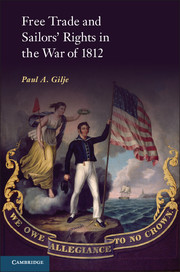Conclusion
Published online by Cambridge University Press: 05 March 2013
Summary
By the eve of the Civil War, free trade and sailors’ rights had become a catchall that was almost divorced from its original meaning. At the beginning of the War of 1812 the phrase had represented a potent mixture of patrician ideas borrowed from the Enlightenment and plebeian ideas derived from the experience of the Age of Revolution. There were many reasons for the War of 1812, but for most Americans a few simple words encapsulated what they were fighting for and served as a powerful retort to any insult issued by an aristocratic Briton. Free trade highlighted the importance of new economic relations among people and nations. Sailors’ rights brought the world of Jack Tar front and center to the American national consciousness and emphasized the ideal of equality. But once the war was over, the many uses of the words weakened their meaning even as they appeared and reappeared in a host of contexts.
The ideals behind each component of Porter's motto had a long lineage. Concern with free trade predated the Enlightenment. The Age of Reason, however, provided an intellectual context and rationale for free trade that swept across the Atlantic from Europe and inspired American revolutionaries who hoped to change the world. But free trade was a slippery concept that had different meanings in different contexts. Free trade could refer to openly trading in any market, the removal of mercantilist restrictions, the setting up of reciprocal agreements whereby merchants from the complying nations pay the same duties and fees in each other's ports, the reduction or removal of all tariffs, or the protection of neutral rights. The boundaries between these definitions were hazy and clouded with ambiguity. In the years before their revolution, the use of free trade by Americans reflected each of these overlapping definitions, and during the fight for independence the words “free trade” emerged as an ideal in both domestic and diplomatic arrangements. Indeed, the phrase gained such a hallowed status that it became associated with the meaning of the American Revolution. Although some Americans argued for price controls during the war, ultimately almost all Americans embraced the emerging market economy as the most sensible way to encourage growth. First the Articles of Confederation, and then, more forcefully, the Constitution created a free trade zone without tariffs and duties among what might have become the divided states instead of the United States.
- Type
- Chapter
- Information
- Free Trade and Sailors' Rights in the War of 1812 , pp. 337 - 344Publisher: Cambridge University PressPrint publication year: 2013



